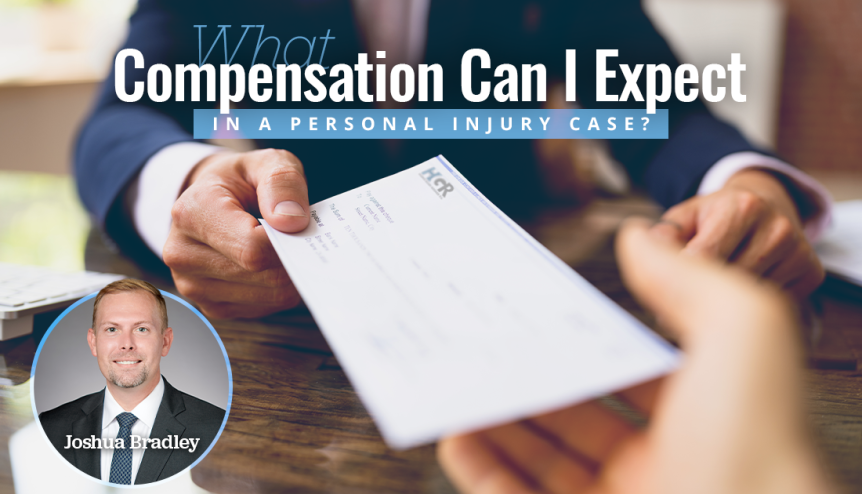If you’ve been injured in an accident in Florida and are pursuing a personal injury case, one of the most common questions you may have is: What compensation can I expect? The compensation you can receive depends on the nature of your injuries, the circumstances of the case, and the types of damages available under Florida law. Understanding the types of damages that may be awarded is crucial in setting expectations for what you may receive as compensation.
Types of Damages in a Florida Personal Injury Case
In a personal injury case, the types of damages that may be awarded are divided into three categories: economic damages, non-economic damages, and in some cases, punitive damages. These categories are determined based on the extent of your injury, the defendant’s behavior, and the impact the injury has had on your life.
1. Economic Damages
Economic damages are designed to compensate you for verifiable, out-of-pocket expenses that directly result from the injury. These damages are typically easy to calculate because they involve specific monetary losses, such as:
• Medical Expenses: These include the costs of any medical treatment you have received for your injuries, including hospital stays, surgeries, doctor’s visits, physical therapy, prescription medications, and future medical costs if your injuries require ongoing treatment.
• Lost Wages: If your injuries have caused you to miss work, you may be entitled to compensation for the wages you’ve lost as a result. In Florida, this includes both past lost wages and any future wages you may lose if your injuries prevent you from returning to work or performing your job duties.
• Property Damage: If your vehicle or other personal property was damaged in the accident, the jury may award compensation for the cost of repairs or replacement of those items.
• Other Out-of-Pocket Expenses: This could include costs such as transportation to medical appointments, modifications to your home (e.g., wheelchair ramps), or the cost of hiring help for household chores if your injuries prevent you from performing them yourself.
2. Non-Economic Damages
Non-economic damages compensate you for the more subjective, intangible aspects of your suffering that can’t be easily quantified in monetary terms. These damages reflect the physical, emotional, and psychological impact of your injuries on your daily life and well-being. Non-economic damages typically include:
• Pain and Suffering: This is compensation for the physical pain you’ve experienced as a result of your injuries. It includes the pain endured at the time of the accident, during treatment, and any ongoing or chronic pain resulting from your injury.
• Emotional Distress: If your injury caused you emotional harm, such as anxiety, depression, or post-traumatic stress disorder (PTSD), you may be entitled to compensation for the psychological toll your injuries have had on your mental well-being.
• Loss of Enjoyment of Life: If your injury has interfered with your ability to enjoy everyday activities (such as hobbies, travel, or spending time with loved ones), you may be entitled to compensation for this loss of quality of life.
• Loss of Consortium: In Florida, a spouse can file a claim for loss of consortium, which compensates for the loss of companionship, affection, and sexual intimacy caused by the injury to their partner.
3. Punitive Damages
Punitive damages are different from economic and non-economic damages because they are not meant to compensate you for your losses. Instead, punitive damages are intended to punish the defendant for particularly reckless, malicious, or grossly negligent behavior and to deter similar conduct in the future.
• No Cap on Punitive Damages in Florida: Unlike some states, Florida does not impose a cap on punitive damages. However, there are guidelines that the jury must follow when determining the amount of punitive damages to award. Punitive damages may be awarded in cases where the defendant’s conduct was particularly egregious.
• Factors Considered in Awarding Punitive Damages: In Florida, when determining the amount of punitive damages, the jury will consider factors such as the defendant’s financial situation, the severity of the misconduct, and the need to deter similar behavior in the future. While there is no strict cap on punitive damages, the jury must follow the framework set by Florida law to determine an appropriate amount.
Conclusion: What Compensation Can You Expect?
When pursuing a personal injury claim in Florida, the compensation you can expect is dependent on the nature of your injuries, the extent of your losses, and the behavior of the defendant. Economic damages, such as medical expenses and lost wages, are typically the easiest to calculate and provide direct compensation for out-of-pocket losses. Non-economic damages, such as pain and suffering, aim to compensate you for the intangible impact of your injury on your life. Punitive damages are rare but can be awarded in cases involving gross negligence or malicious conduct.
Having an experienced personal injury attorney by your side is crucial for navigating the complexities of the legal process and ensuring that you receive the compensation you deserve. Your attorney will help you gather the necessary evidence, calculate damages, and present your case effectively, maximizing your chances of receiving fair compensation for your injuries.
If you’ve been injured and are considering a personal injury case, don’t hesitate to consult with a skilled Florida attorney who can guide you through the process and protect your rights. The road to recovery can be long, but with the right legal support, you can receive the compensation you need to rebuild your life.
